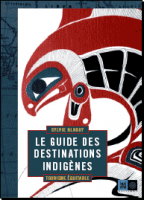JOURNAL OF ECOTOURISM : SPECIAL ISSUE ON "ABORIGINAL ECOTOURISM"
Guest editors :
Dr R. Harvey Lemelin (School of Outdoor Recreation, Parks and Tourism, Lakeheead University, 955 Oliver Rd., Thunder Bay, Ontario, Canada, Email : Harvey.lemelin@lakeheadu.ca
Sylvie Blangy, European Marie Curie Research Fellow, Department of Geography & Environmental Studies, Carleton University, Ottawa, Canada, Email : sblangy@connect.carleton.ca
CALL FOR PAPERS
Despite recent studies and research, marketing campaigns, Aboriginal ecotourism (also known as Indigenous ecotourism) when compared to other forms of tourism, has been comparatively under-studied. Given the growth in Aboriginal ecotourism (note this does not include gambling and casinos) and its potential impacts, it is important to assess the current knowledge regarding Aboriginal ecotourism, and to discover to what extent Aboriginal community needs are addressed by scholarly research in Aboriginal ecotourism. This special issue on Aboriginal ecotourism in the Journal of Ecotourism will feature empirical research, feature conceptual, theoretical, and development models providing a greater understanding of aboriginal tourism, while promoting the concepts of capacity building, respect, equity generation, and empowerment in aboriginal communities. Special emphasis will be placed upon multidisciplinary and/or collaborative articles written by academic and indigenous partners.
The guest editors invite interested researchers to contribute theoretical and/or empirical papers related to the theme of this special issue. The topics of potential manuscripts include, but are not limited to :
– Research projects or development models that are contextually grounded and based on research data
– Projects or development models that incorporate ethical criteria, sustainability, local protocols, equity generation and empowerment
– Research highlighting how Aboriginal ecotourism contributes to the well being of aboriginal communities, preserves and enhances traditional cultures, sustains natural resources, and helps community members face the challenges of climate change and economic dependency
– Research demonstrating how traditional practices, traditional ecological knowledge, local protocols can be incorporated into current social and economical contexts
– Are indigenous communities influenced and inspired by visions of sustainability in the development of ecotourism related activities in their land management practice, the conservation of the biological diversity and the revival and/or the preservation of their cultural integrity ?
– Can aboriginal ecotourism encourage natural resource management.
– Profiling the visitor : Who are aboriginal ecotourists ? What do they expect ? Are they satisfied with their experiences ?
– What kind of aboriginal ecotourism experiences are available ?
– How can aboriginal ecotourism stimulate traditional practices, traditional ecological knowledge, and socio-cultural practices
– The use of new technologies, web based surveys, integrated web sites, geoportal, geomatics to improve communication, interpretation, networking, marketing, capacity building, training and product design in the aboriginal tourism
– The role of collaborative, participation action research, or advocacy research in aboriginal ecotourism
Collaborative papers, and/or papers written in conjunction with community partners are strongly encouraged.
SUBMISSION GUIDELINES :
1. Authors are invited to submit a 400-500 word abstract for consideration for the special issue. Electronic submissions (ideally, Microsoft Word files) should be sent by e-mail attachment to harvey.lemelin@lakeheadu.ca and sblangy@connect.carleton.ca
2. Selected authors will then be asked to produce a full paper based on their abstract.
3. Full paper submissions should be submitted electronically as e-mail attachments (ideally, Microsoft Word files) to harvey.lemelin@lakeheadu.ca and sblangy@connect.carleton.ca
4. Submission guidelines associated with full papers and research notes for the Journal of Ecotourism can be found on at http://mc.manuscriptcentral.com/cvp-joe.
5. Articles should be 5000-6000 words in length. The Journal of Ecotourism also accepts shorter research notes of 1000-2000 words in length. Full details of the format for papers are available at : http://www.multilingualmatters.com/multi/journals/journals_je.asp?TAG=&CID
6. All submissions will be anonymously reviewed by two independent reviewers.
IMPORTANT DATES :
– Abstract deadline : December 21, 2007
– Notification of acceptance of abstracts deadline : January 15, 2008
– Submission of full paper deadline : May 15, 2008
– Notification of acceptance of full papers : August, 15, 2008
– Submission of revised, accepted papers : September 15, 2008
– Special issue publication : March 2009


